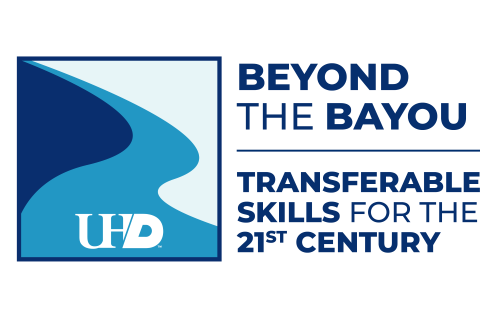If Steve Jobs was correct in his assertion that personal computers, and by extension smartphones and other daily technologies, are “bicycles for the mind,” then it stands to reason that any university student must graduate with an ability to ride. One of the goals for UHD’s 2026 Quality Enhancement Plan (QEP), “Beyond the Bayou: Transferable Skills for the 21st Century,” is to impart this ability to ride by allowing students to learn skills in Technology, as well as Decision Making, Professionalism, and Communication. Students will have the opportunity to earn digital badges for each skill by completing fully online, self-paced micro-credential courses to be made available online in Canvas.
For September, Technology will be highlighted, along with the skills and credentials students can expect to attain and subsequently showcase on their resume or LinkedIn profile. Abdelnasser Hussein, Ph.D., Assistant Professor of Educational Leadership, says the micro-credential in Technology will “empower learners with practical, ethical, and strategic technology skills that enhance personal, academic, and professional effectiveness.” He added that it will promote intentional technology use to support goal achievement, problem-solving, collaboration, and responsible digital citizenship.
These target competencies will be achieved and assessed in five modules that will each cover a different approach or use of technology (see below):
Module 1: Technology Utilization
- Use technology to set, manage, and achieve personal and professional goals.
- Apply tools for organization, time management, and productivity.
- Reflect on initial attitudes and evolve understanding of tech’s role in success.
Module 2: Technology Evaluation
- Critically assess digital tools and apps for effectiveness and relevance.
- Apply evaluation criteria to determine the best-fit technology for specific needs.
- Understand the importance of informed tech selection.
Module 3: Technology for Problem Solving
- Use technology to analyze and solve real-world problems.
- Apply the problem-solving cycle with tech-based solutions.
- Select appropriate tools based on problem context and desired outcomes.
Module 4: Ethical Technology Use
- Demonstrate responsible and ethical behavior in digital environments.
- Understand legal and institutional responsibilities.
- Identify and address ethical issues in digital platforms and tools.
Module 5: Technology Integration
- Integrate technology meaningfully into academic or professional projects.
- Create and present digital artifacts (e.g., ePosters) using tech tools.
- Understand principles of effective and responsible tech integration.

